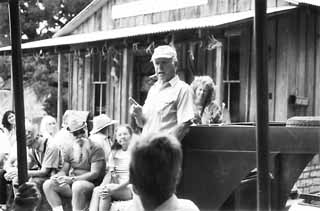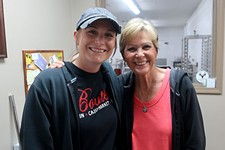Day Trips
J. David Bamberger has taken a slice of the Hill Country and restored it to pristine beauty.
By Gerald E. McLeod, Fri., Oct. 12, 2001

Bamberger Ranch looks like paradise in God's country. The rugged landscape is lush with tall grass, and the shaded valleys are filled with crystal-clear streams. This stretch of the Hill Country about five miles south of Johnson City wasn't always a shining example of land management.
When J. David Bamberger first visited the plot some 35 years ago, the 3,000 acres were a dry moonscape covered with junipers (cedars). At the beginning of a Sunday morning tour of the ranch, Bamberger said he was looking for the least desirable piece of land he could find because it was cheap, and he wanted the challenge of bringing it back after years of neglect.
Bamberger's life story has become legendary in Central Texas. The son of a poor Ohio farmer, the now 73-year-old went to work selling Kirby vacuum cleaners after college. In 1953, he landed in San Antonio as a sales manager known for inspiring his sales force.
One of the salespeople was Bill Church, son of the founder of a regional chain of fried chicken stands. With Bamberger as an investor and later the chairman of the company, Church's Fried Chicken became the first Texas fast-food organization to go public.
Bamberger purchased his first ranch near Bulverde in 1959. Inspired by Pleasant Valley, a book written by Louis Bromfield and given to him by his mother, Hester, Bamberger set out to put Bromfield's ideas of habitat restoration to work.
The remarkable change to the property under Bamberger's stewardship is most evident at the fence line. On one side the junipers choke out the other plants. On Bamberger's side of the fence grass is the predominant vegetation, but the hills are covered with a diversity of plants.
"When we first came here," Bamberger says, "we drilled seven wells to 500 feet and didn't get a drop of water. The first years we saw only 48 species of birds, now we've counted over 155. The best deer harvested field-dressed at 55 pounds, now the average is 105 pounds."
Clearing the juniper was the first step of restoring the ranch that has grown to 5,500 acres. Bamberger named his corner of the Hill Country "Selah," a Biblical term used in the Psalms that invites the reader to pause and reflect on the message.
On the tour of the ranch, Dr. Lew Hunnicutt, a former professor of agriculture at Southwest Texas State University working at the ranch as the resident "grass Aggie," explains that the gnarly juniper trees can suck 16 to 20 gallons of water out of the ground a day. On top of that, the leaves and limbs are very efficient in directing rainfall to its roots, starving other plants.
The juniper does offer critical habitat to animals, Hunnicutt says, but it took over because man overgrazed the land and suppressed wildfires, removing them from the natural restorative process. He uses series of boxes and trays to show what happens when it rains on grassland compared to juniper-covered land. The grass-covered soil filtered the water and took four times as long to drain as the other. "It's not enough to clear the cedar," Hunnicutt says, "You have to manage the grass with grazing and prescribed burns."
From the rainfall demonstration next to the lake, David's wife Margaret takes over the tour. As athletic as her husband and with the same gift of salesmanship, Margaret leads the group through a spring-fed valley pointing out trees they have planted and other plants.
After a bumpy ride in the back of a trailer pulled by a battered pickup driven by David, Margaret takes over again to show the guests the dinosaur tracks. On the drive across the pastures filled with cattle and sheep guarded by a llama, Colleen Lyons gives the group a narrative of the operation. It's a working ranch as well as a conservation laboratory and school, she says.
In a far pasture, David pulls the truck to a stop as two herds of brown and white Scimitar-horned Oryx run in waves through the thick grassland. Extinct in their native Africa, the San Antonio Zoo asked Bamberger to take the herd to help preserve the worldwide gene pool, Lyons explained. Then the trailer turns around and drives by the chiroptorium, a man-made cave that Bamberger hopes will some day be home to a million bats.
The three-hour tour ends at Hes' Country Store, the ranch's museum, where Bamberger, still possessing the charm of a carpet cleaner and chicken salesman, gives one last impassioned speech to the tired, but inspired guests. The world is connected, he says. What landowners do in the Hill Country can have far-reaching effects down stream. We all have a stake in ecological, cultural, and historic preservation.
The Bamberger Ranch opens to the public on a limited basis. The tours are all full for the rest of this year, but now is the time to reserve a spot for next spring. To join a volunteer workday, contact Penny Weibly at the ranch.
Not only is Hes' Country Store a museum, but it is also a bed and breakfast inn. Among the ranch's other facilities is the Center, a conference hall with two dormitory-style sleeping wings and kitchen. The ranch also offers workshops throughout the year on grasses, trees, water, land management, and ranching for the owners of large or small spreads.
The ranch's Web site, www.bambergerranch.org, is the best way to find out what future opportunities are available at the ranch. Because almost everyone at the ranch spends the day working outside, the telephone (830/868-7303) usually is answered by the answering machine. They are prompt about answering e-mail at selah@star.net.
540th in a series. Day Trips, Vol. 2, a book of "Day Trips" 101-200, is available for $8.95, plus $3.05 for shipping, handling, and tax. Mail to: Day Trips, PO Box 33284, South Austin, TX 78704.








